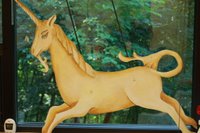Back in the Saddle
The adrenaline was pumping so hard during most of July that when last weekend was over I hit the ground hard. I'm now almost back to being a contributing member of society.
Adieu Ory So happy with Comte Ory on so many different levels. The Flying Cow and his Act II storm scene friends are temporarily adorning the windowsills of my office, awaiting a more permanent installation.
So happy with Comte Ory on so many different levels. The Flying Cow and his Act II storm scene friends are temporarily adorning the windowsills of my office, awaiting a more permanent installation.
Cast members have moved on to new projects, in the true ensemble spirit that is our company. A few of them are prepping their August 12 recital with Steve Blier. And others have leapt straight into Figaro - the Gouverneur is Figaro himself, Raimbaud has become Antonio, Ragonde is Marcellina, Ory has turned into Don Curzio, and Alice has morphed into Cherubino.
Such Sweet Sorrow
And a fond farewell to Romeo et Juliette. Again, some personal bests for our singers, and a night of beautiful music with the NSO. Juliette has moved on to Mozart's Countess, Romeo is Don Basilio, Paris has become the Count, and Friar Laurence is Bartolo. 19 singers in 57 assignments over 14 weeks. Either a casting director's dream, or a nightmare. (Almost always the former, by the way.)
Semi-staging is, as I said in last summer's blog, a "crazy-making thing." We've now had a few years’ experience with this format. It doesn’t make the process simpler, but it does make it easier to recognize the free-floating anxiety that inevitably accompanies its birth. And when it's done well, it's extremely satisfying. I would never want to forsake our full productions, for that synthesis of visual and musical arts is what opera is all about. But as a way to bring a concert alive, allow our artists to explore new roles, and bring the audience into the center of the music - well, semi-staging is a wonderful thing.
Unsolicited Advice
An odd series of interactions with well-meaning folks during last week's Carmina Burana. Three of our singers did brilliant work with the NSO as soloists, but during the course of the rehearsals, each one of them had a curious conversation with other people (unnamed and unidentified for the obvious reasons) who were involved in the rehearsals.
The oddest one came in the form of an offer of some vocal coaching before that night's performance so that the soloist in question wouldn't be embarrassed. Even though I support our artists unstintingly, I'm the first one to recognize when improvement is called for. But this particular criticism (much more lengthy than I just described) came out of left field.
Musicians (especially singers) tend to be hypercritical of themselves and of others, and the fact that this kind of disapproval exists is no surprise. What is odd, in my opinion, is that someone would so freely approach a soloist with this type of conversation. We mused about it for a while and determined that some of it may be related to the relative age of our artists (mid-late 20's). And I do believe that because we encourage a healthy, relaxed, anti-diva approach to our work, it doesn't erect the kind of barrier that some people are used to seeing around solo artists.
Well, whatever the cause, it was weird.
Further Adventures in Audience Interaction
I did my usual series of pre-show talks before the Barns operas - something that I used to obsess a lot about, but that lately I enjoy very much. There's always at least 5-10 minutes for audience questions, and over time I've found this period of gentle interrogation falling into 4 distinct patterns:
1) The vast majority of inquiries pick up on something I've alluded to in the talk but haven't fully described. Or, perhaps something that's an obvious puzzlement about the opera that I've conveniently side-stepped :)
2) General questions about the Wolf Trap Opera Company - how we find our singers, etc.
3) Comments thinly veiled as questions that are meant to expose something about which I'm not an expert, but the questioner clearly is. I used to live in fear of these moments, but in recent years I'm all too happy to declare my relative stupidity and allow the other person to briefly educate us.
and 4) The rather rare completely random question. And I got a bunch of these last week. Why doesn't the Washington National Opera do performances in the Eisenhower Theatre (mid-sized venue at the Kennedy Center) any more? What do I think about the current state of criticism at the Washington Post? Exactly how much did this production cost? How much do we pay our singers? Why don't the unions get out of the way and let us record and broadcast our operas? And on and on. Danger, Will Robinson.
I was looking forward to doing a pre-show talk for Romeo et Juliette over at the park last week, but we got rained out. (I actually got about 3 minutes into it because we were forced to run for cover.) Just so I don't feel as if my preparation was for naught, here's what we would've covered...
- Quotes from Gounod's many letters to his wife while he was writing Romeo. Thoughts about how easy it was to concentrate in the countryside of Provence, and how difficult it is to do any real work in the hectic life back in the city. Comments about how working on this opera made him feel 20 years old again.
- A discussion about our semi-staging, and why it's both frightening and rewarding. And how it's actually easier for Romeo to sing the balcony scene when he's not craning his neck constantly to see a Juliette who's 10 feet above him.
- Great stories about this opera onstage. When a crazed patron stormed the stage in Chicago and Jean de Reszke drew his prop sword to protect Nellie Melba. When Adelina Patti (then the married Marquise de Caux) bestowed 29 very real kisses on tenor Ernesto Nicolini in Paris. (She became Mrs. Nicolini shortly afterward.)
- And, a discussion about the cuts that brought our concert version in at around 2 hours in length. When you're making these cuts it feels blasphemous. But we all decided that this version is in many ways preferable. A surfeit of sentimentally romantic music can become cloying after 3 hours but manages to remain refreshing in a trimmed state.
Powerful People
Just in case you haven't seen Opera News' August list of the 25 Most Powerful People in opera, you'll be happy to know that two of the four conductors listed have histories at Wolf Trap. And one of those - Stephen Lord - was here conducting Romeo at the time the issue went to print! (I don't think it's online yet, but probably will be as of August 1: check www.operanews.com) The only other reaction I have to the list is that opera is still very much a man's game...
Moving On
Although we have one concert and one production to go, this week is all about 2007. First budget draft, audition application prep, and audition tour scheduling. Thank goodness I have the dragon to keep me company.

2 comments:
The only other reaction I have to the list is that opera is still very much a man's game...
I had the very same thought...
Kim, I very much enjoy your pre-performance talks. And I'm happy you've dispensed with your anxiety about an inability to answer a few estoteric questions from the audience.
As an audience member, it seems to me that those types of questions are an ego-boost for the questioner ("See what I know").
The rest of us have no problem when you say, "I don't know", because you've already told us plenty of cool stuff that we're actually interested in. We are not concerned that you may not know this or that minor historical detail.
Post a Comment